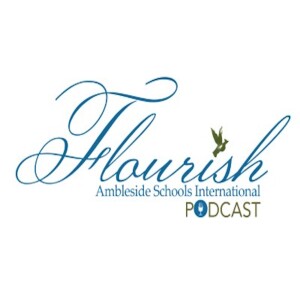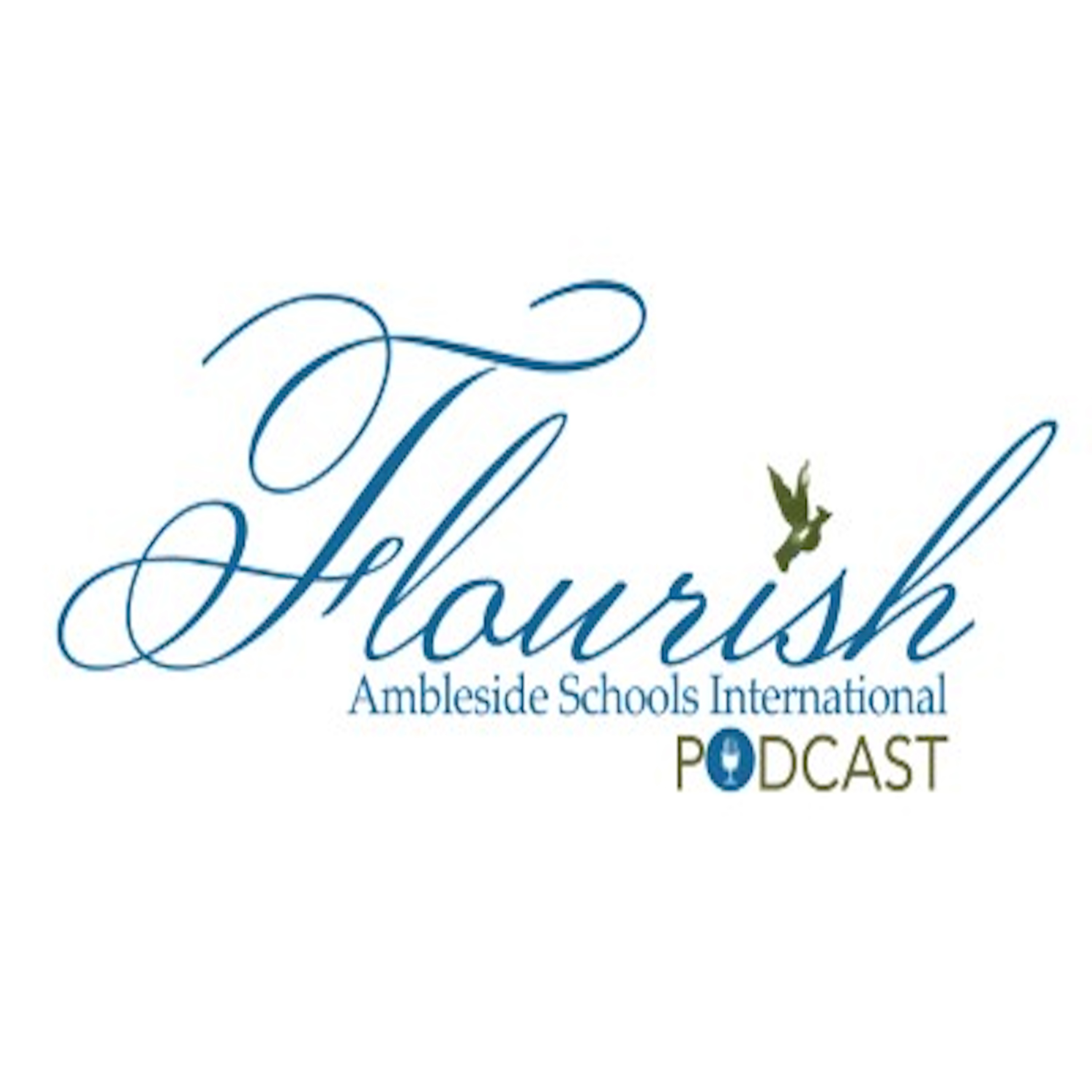Episodes

Wednesday Aug 19, 2020
Children Are Born Persons --- Part 1
Wednesday Aug 19, 2020
Wednesday Aug 19, 2020
The first article of a valid educational creed – “children are born persons” – is of a revolutionary character; for what is a revolution but a complete reversal of attitude? - Charlotte Mason

Friday Jul 10, 2020
Knowing God
Friday Jul 10, 2020
Friday Jul 10, 2020
Education is the science of relations, relations with saints and sinners, the past and the present, earth and sky, art and craft, work and leisure. Still, there is more. read more.

Thursday Jun 07, 2018
The Art of Narration - Defined and Demonstrated with Maryellen St. Cyr
Thursday Jun 07, 2018
Thursday Jun 07, 2018
Charlotte Mason called narration the ground-plan of education. Maryellen St.Cyr instructs in this art of telling back with students of varied ages. See how students exhibit the power of narration as they have read/listened to a single reading with attention and concentration and "have in every case reproduced what they have read in narration"
This is a series of Videos demonstrating Narration the videos demonstrations are located here.

Thursday May 31, 2018
Educating with the Brain in Mind Seminar Dr. Bill St. Cyr
Thursday May 31, 2018
Thursday May 31, 2018
"To be a teacher you just manipulate their sense experience in such a way as to write on the blank slate of the students mind. We cannot as Christians believe that's all there is to education. As Christians we believe you can know God. And that is not just the processing of sensory information." ~Dr. Bill St. Cyr @ Educating With the Brain in Mind Seminar
Dr. Bill St. Cyr is a gifted educator, counselor, teacher trainer and conference speaker. Since 2001, he has partnered with his wife in giving leadership to Ambleside Schools International. Prior to becoming Executive Director of ASI, Bill taught high school at Ambleside of Fredericksburg and spent ten years in private practice as a pastoral counselor. His professional experience includes serving as a youth minister, providing leadership to a discipleship ministry on Capitol Hill, and serving as assistant to the Chaplain of the United States Senate. Bill's academic degrees include B.A. in political science (Louisiana State University), M.A. in theology with an emphasis in patristics (Catholic University of America), and M.S. and Ph.D. in pastoral counseling (Loyola of Maryland).
NOTE: The use of "animal brain"or the "reptilian brain" makes reference to the oldest of the three that controls the body's vital functions such as heart rate, breathing, body temperature and balance. The reptilian brain includes the main structures also found in a reptile's brain: the brainstem and the cerebellum.
Video here

Thursday May 24, 2018
Educating with the Brain in Mind Seminar Maryellen Marschke St. Cyr
Thursday May 24, 2018
Thursday May 24, 2018
"Charlotte Mason used the analogy as food for the mind as food for the body. What are we eating? What are our children eating? What is their mind food? Not just in the hours of school but in the hours of home. What are they feasting upon? Or what are they starving for?" ~Maryellen Marschke St. Cyr Educating With the Brain in Mind
Maryellen Marschke St. Cyr M.Ed. A professional educator for more than 30 years, Maryellen St. Cyr has spent thousands of hours in the classroom and hundreds of hours observing other educators. Possessing a passion for a congruent, life-giving method of education, she has become one of the foremost experts on the "common sense" educational philosophy of 19th-century British educator, Charlotte Mason. Maryellen is a primary author of When Children Love to Learn and founder of Ambleside School of Fredericksburg and Ambleside Schools International.
Video here
![Education is 99% Habits and 1% Knowledge with Maryellen St. Cyr Part 2 [BASECAMP Live]](https://pbcdn1.podbean.com/imglogo/ep-logo/pbblog2435916/cover.jpg)
Monday May 07, 2018
Monday May 07, 2018
Classical Christian parents and educators are fond of saying “education is more than information – it is formation”… but what does formation really look like in a practical way? 100 years ago British educator Charlotte Mason wrote on how affections and habits are formed, noting what neuroscientists are now claiming as a new discovery!
Maryellen St. Cyr went through a dramatic shift in her understanding of education after spending time researching the British educator Charlotte Mason and now runs 21 schools around the world based on this philosophy of education. Mason’s insights on how children learn and how thoughts and affections are formed is a critical element often missing in our homes and classical Christian schools. Join us along with David Goodwin, president of the ACCS on this episode of BaseCamp Live.
Maryellen St. Cyr is the Founder of Ambleside School of Fredericksburg, Ambleside Schools International and Ambleside Homeschool.
A professional educator for more than 30 years, Maryellen has spent thousands of hours in the classroom and hundreds of hours observing other teachers. Possessing a passion for a congruent, life-giving method of education, she has become one of the foremost experts on the “common sense” education philosophy of 19th-century British educator, Charlotte Mason. Maryellen is a primary author of When Children Love to Learn and shares insights into education here.
![Education is 99% Habits and 1% Knowledge with Maryellen St. Cyr Part 1 [BASECAMP Live]](https://pbcdn1.podbean.com/imglogo/ep-logo/pbblog2435916/cover.jpg)
Monday Apr 30, 2018
Monday Apr 30, 2018
Classical Christian parents and educators are fond of saying “education is more than information – it is formation”… but what does formation really look like in a practical way? 100 years ago British educator Charlotte Mason wrote on how affections and habits are formed, noting what neuroscientists are now claiming as a new discovery!
Maryellen St. Cyr went through a dramatic shift in her understanding of education after spending time researching the British educator Charlotte Mason and now runs 21 schools around the world based on this philosophy of education. Mason’s insights on how children learn and how thoughts and affections are formed is a critical element often missing in our homes and classical Christian schools. Join us along with David Goodwin, president of the ACCS on this episode of BaseCamp Live.
Maryellen St. Cyr is the Founder of Ambleside School of Fredericksburg, Ambleside Schools International and Ambleside Homeschool.
A professional educator for more than 30 years, Maryellen has spent thousands of hours in the classroom and hundreds of hours observing other teachers. Possessing a passion for a congruent, life-giving method of education, she has become one of the foremost experts on the “common sense” education philosophy of 19th-century British educator, Charlotte Mason. Maryellen is a primary author of When Children Love to Learn and shares insights into education here.
![How do we form a human soul? What Charlotte Mason knew about the art of education. [BASECAMP Live]](https://pbcdn1.podbean.com/imglogo/ep-logo/pbblog2435916/cover.jpg)
Monday Apr 23, 2018
Monday Apr 23, 2018
How do we make education a joyful discovery? Is it knowledge alone or do relationships have something to do with it? What kind of relationship does your child have with history, with their siblings, with math, with their teacher? If relationships are important, how do we shape the affections of what our children love? Perhaps the environment we create, and what we celebrate or criticize can have a huge impact. Learn more about what Charlotte Mason knew about children and how they learn as we welcome Bill St. Cyr, co-founder of Ambleside Schools International.

Wednesday Feb 21, 2018
Growth Focus
Wednesday Feb 21, 2018
Wednesday Feb 21, 2018
The heart of a child will shape how they live and how they experience life. “Growth means the formation of new habits, habits formed with the right kind of heart, the right kind of intrinsic motivations, which have to be cultivated relationally.” Dr. Bill St. Cyr, of Ambleside Schools International, speaks of the importance of maintaining healthy relationships between teachers, students, and texts. Charlotte Mason wrote, “The question is not, -- how much does the youth know? when he has finished his education -- but how much does he care? and about how many orders of things does he care?

Wednesday Feb 21, 2018
Method of a Lesson Part 2
Wednesday Feb 21, 2018
Wednesday Feb 21, 2018
The Method of the Lesson, as described by Charlotte Mason, is marked by five steps. Bill and Maryellen St. Cyr, of Ambleside Schools International, continue discussing the of the Method of the Lesson, describing the reading of an episode, narration, and the second talk. While the teacher points to ideas in the text, the children must do the work of thinking and learning.
”The children themselves must do the mental work. They must engage their minds - they must do the attending; they must do the reflecting; they must make use of the ideas.

Tuesday Feb 20, 2018
Method of a Lesson Part 1
Tuesday Feb 20, 2018
Tuesday Feb 20, 2018
A renewing vision and philosophy of education must lead to an applied method. Bill St. Cyr of Ambleside Schools International discusses and gives examples of the first two steps of the 5-part Method of a Lesson used at Ambleside schools. It begins with a well-chosen text; this could be a book, a flower, or a musical composition. The relationship between the student and idea-rich texts is what Charlotte Mason meant by a living education. “Just as the human body needs nourishment and exercise to flourish, so the human mind needs the nourishment of ideas, but it also needs exercise. In exercising, the mind attends, it reflects, and it uses that which it is learning.

Monday Feb 19, 2018
Cultivating Relationships with Learning
Monday Feb 19, 2018
Monday Feb 19, 2018
In many school environments, children have to choose between subjects, and they are often drawn only to subjects they like. Charlotte Mason thought it should be otherwise. She envisioned an educational feast in which students develop wide relationships with this world. She called it our Great Inheritance. “As is often the case in traditional settings, people grow in the areas that they’re already interested in. And yet, what we’ve seen at Ambleside, is real joy and real delight in learning in a varied array of subjects.” Bill and Maryellen St. Cyr, of Ambleside Schools International, discuss the delight of children and adults as they experience a broad curriculum. “We must be very, very intentional and careful about the dynamics between teacher, taught, and the text, for only then will there be a life-giving education.

Sunday Feb 18, 2018
Building the Passion to Know
Sunday Feb 18, 2018
Sunday Feb 18, 2018
Is the true goal of education to learn? Or is it to win a prize and impress others? “Build the character; build the love for learning; build the passion to know; build the discipline to work well – [and] all of that takes care of itself.” Ambleside Schools curriculum includes 16-17 subjects, following Charlotte Mason’s idea of the importance of giving children as many relationships as possible at the very beginning of their lives. Bill and Maryellen St. Cyr, of Ambleside Schools International, discuss how to direct students’ minds toward learning. “As a school, we’ve got to be very intentional about the kinds of relations we’re cultivating, and the kinds of ideas that are ceding those relations.

Saturday Feb 17, 2018
Establish a Strategy
Saturday Feb 17, 2018
Saturday Feb 17, 2018
Habit formation is an exercise in formation, cultivation, and helping children grow up – it is not an exercise in controlling the child for one’s own comfort. Proper habit formation includes an inspiring Idea, a joyful working alliance, and establishing a strategy. Bill St. Cyr, of Ambleside Schools International, discusses the important steps in exercising a strategy for growth. “When we act with what Charlotte Mason calls Tact, Watchfulness, and Persistence, then we find in the child those rails of habit laid down which will lead them to easily, smoothly, have the kind of relationships with God, self, others, work, the whole created universe, that we long for our children to have.”

Friday Feb 16, 2018
Building a Working Alliance
Friday Feb 16, 2018
Friday Feb 16, 2018
There has been a revolution in brain science in the discovery of the brain’s ability to form and reorganize neurological connections– neuroplasticity. Charlotte Mason argued for neuroplasticity 120 years ago: “Habit is to life what rails are to transport cars.” When we learn a new habit, we get a new brain as a result of these new neural connections. How do we train in the habit of managing distress well? Persevering when head and hand are tired? Bill St. Cyr of Ambleside Schools International points out that we are always training in habit. …The only question is, “Are you training good habits or bad habits?”

Thursday Feb 15, 2018
Training Good Habits
Thursday Feb 15, 2018
Thursday Feb 15, 2018
How do adults effectively support children in habit formation? Habits are best cultivated in a relational manner that reflects genuine care; Charlotte Mason describes this relationship as the “friendly ally.” Adults have to lay down the rails, do the leg work, stand beside the child, remain consistent, always joyful to be with the child. Bill St. Cyr, of Ambleside Schools International, discusses how to cultivate a habit of humility, beginning with sowing an idea and building an alliance around an idea.

Wednesday Feb 14, 2018
What is a Habit?
Wednesday Feb 14, 2018
Wednesday Feb 14, 2018
How do we lift children above what is their nature? Charlotte Mason wrote, “Habits are to life as rails are to a train.” Bill St. Cyr, of Ambleside Schools International, discusses the role habit formation plays in the lives of individuals. “Charlotte Mason was a hundred years ahead of her time when it comes to her understand of how the brain functions. She knew that when a habit was formed, there was a change in the very grey matter of the brain. We now know much more clearly how that happens.” At Ambleside Schools, worthy habits, such as habits of kindness, attention, and careful work are intentionally and carefully formed in our students.

Tuesday Feb 13, 2018
How Much Does the Student Care?
Tuesday Feb 13, 2018
Tuesday Feb 13, 2018
Charlotte Mason wrote, “The question is not, - how much does the youth know? When he has finished his education -- But how much does he care? And about how many orders of things does he care? Dr. Bill St. Cyr of Ambleside® Schools International discusses the role atmosphere plays in cultivating relationships affinities toward history, grammar, science and mathematics. ”Who’s going to be the student that grows to his God-given ability? The student who cares.”
As you listen, use our study guides to assist you in making meaningful connections and increasing comprehension and memory.

Monday Feb 12, 2018
Worthy Work
Monday Feb 12, 2018
Monday Feb 12, 2018
How do we support or undermine the proper attitude toward worthy work? Charlotte Mason writes that it begins with work that is intrinsically satisfying. Poor habits of thinking may overrule a sense of satisfaction with worthy work, and the most well-intentioned adults may inadvertently contaminate the atmosphere. “How do atmospheres get contaminated? They can get contaminated, not only by teacher anxiety, but by the use of artificial rewards and incentives, which demean the joy of knowing, and they demean the student’s capacity for intrinsic motivation.”
Artificial incentives communicate that it is impossible to enjoy history, mathematics, science and literature in and of themselves; we just endure these parts of education to appease the adults and get to the “good stuff”- pizza and a movie.
Dr. Bill St. Cyr of Ambleside® Schools International discusses the sub-text implications of a reward based approach to work.
As you listen, use our study guides to assist you in making meaningful connections and increasing comprehension and memory.

Sunday Feb 11, 2018
Cultivating Tastes
Sunday Feb 11, 2018
Sunday Feb 11, 2018
Cultivating children’s tastes and directing their affections toward what is good, true, and beautiful begins with the development of deeply satisfying relationships with worthy literature, music, art, and more, as well as with a consistent habit of working well. “The atmosphere, the way in which work is talked about, the way in which work is engaged… that will communicate everything to a child about they will relate, how they should relate to work. In a place where hard work is normal, . . . where sweat is part of life, and when staying on task even when head and hand are tired is a good thing, a noble thing; it’s what we ought to do; that’s what we all do here,” children see work as a normal part of life. Charlotte Mason described the deeply satisfying nature of completing set work with excellence; this good and noble habit is cultivated in students at Ambleside® schools and homeschools. Dr. Bill St. Cyr and Maryellen St. Cyr of Ambleside® Schools International discuss the importance of setting an atmosphere that supports a noble approach to work.
As you listen, use our study guides to assist you in making meaningful connections and increasing comprehension and memory.

Saturday Feb 10, 2018
Aesthetics and Atmosphere
Saturday Feb 10, 2018
Saturday Feb 10, 2018
As you listen, use our study guide to assist you in making meaningful connections and increasing comprehension and memony.
Cultivating a taste for the good and beautiful begins with setting the Atmosphere. Beautiful music, art on the walls, wooden furniture all play a part in setting the tastes of a child. Dr. Bill St. Cyr, of Ambleside Schools International, notes that children don’t innately know what is good, what they would like, but rather respond to what is in the Atmosphere. “She [an Ambleside student] had been introduced to beautiful music. Her natural appreciation for beautiful music had been cultivated such that when she heard something that was not beautiful, she was quick to recognize it.

